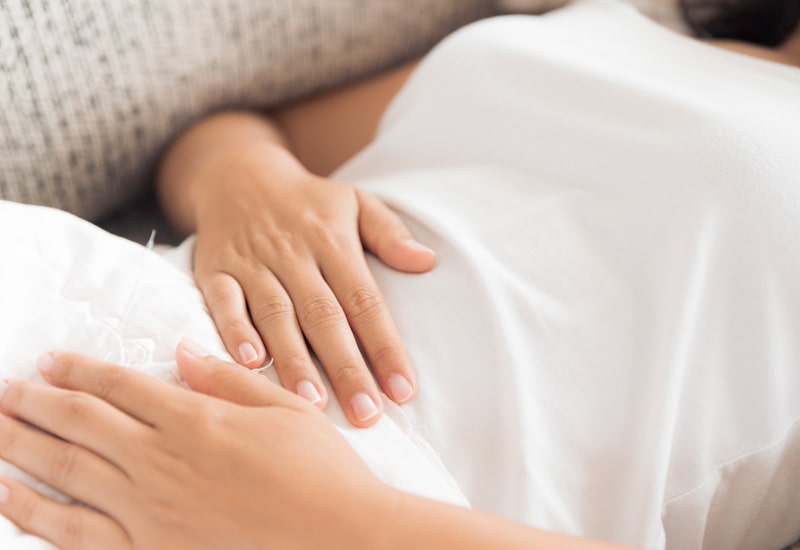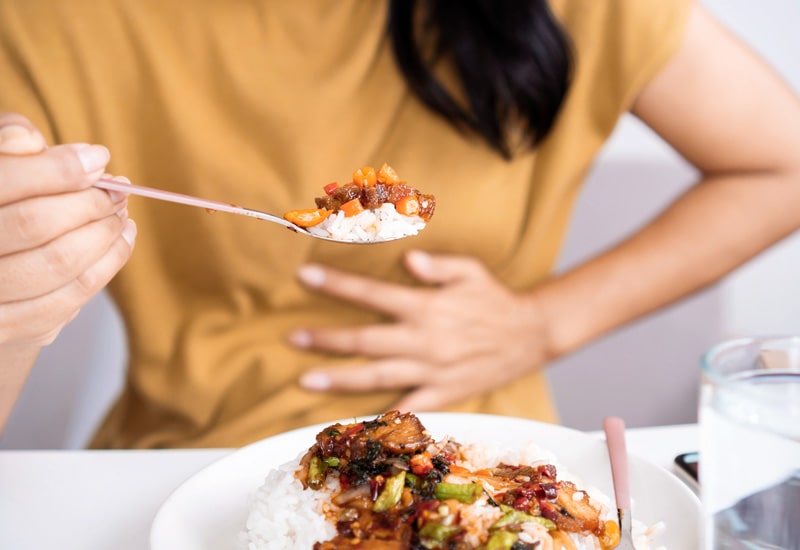How many times do we say "how swollen I feel" at the end of a more demanding meal than usual? The intestine is our second brain, and it can easily be affected by external changes: it is in fact in a delicate balance, and also participates in the correct assimilation of the nutrients that we introduce daily with food. Precisely for these reasons it is important to take care of it, taking care not to alter the bacterial flora in order not to run into uncomfortable problems.

Abdominal bloating is a feeling of increased tension in the abdomen (hard and swollen belly), rather annoying and often caused by excessive accumulation of gas in the stomach or intestines. In fact, it can often happen, after excessively abundant meals or consumption of "different than usual" foods, to feel swollen and weighed down, an unpleasant sensation that can put us in difficulty.
Let's see together why this annoying problem is created and some advice to solve it (or prevent it!).
What is abdominal bloating
About 2 out of 10 Italians suffer or have suffered at various times in their lives from problems related to abdominal swelling. But what exactly is abdominal swelling?
As explained above, it is a feeling of increased tension in the abdomen , alone or accompanied by other disorders, such as constipation or even premenstrual syndrome. The person who suffers from it often feels uncomfortable, representing a great limitation even for social occasions.
Very often this sensation is linked to an excessive accumulation of air in the stomach and digestive tract , with consequent tension and abdominal pain, what is perceived as the typical "hard stomach" after a meal.
However, it is important to point out that bloating is not always due to a single cause, because it is often just a symptom of a pre-existing pathology (such as IBS - irritable bowel syndrome, bloating, aerophagia, celiac disease, lactose intolerance, SIBO - contamination of the small intestine and others).
What can be the causes of swelling
The symptoms of swelling can appear in the hours following a meal or the following day: for this reason it is not always easy to distinguish the type of swelling and identify the cause. In general, we all swallow air when we eat and drink, but in some cases this air can be too much for our digestive tract. Time is always short, and eating quickly or talking during the meal can make the situation worse.

Foods and bad habits to avoid
In general, if you tend to suffer from bloating, it is good to follow these dietary precautions:
- Limit the consumption of foods with gas, such as carbonated drinks or sparkling wines, and reduce excessively leavened industrial products, such as sandwich bread;
- Avoid chewing gum. Suck candy or drink through a straw;
- Eliminate or reduce smoking;
- Reduce fried foods and foods high in fat and salt;
- Consume legumes and vegetables with caution, gradually or in the form of puree or steamed, so that they can be softer, more digestible and tolerable;
- Try to eat foods rich in carbohydrates and fiber in moderation: this depends a lot on individual tolerance, but sometimes fructose can reach the colon "undigested" and create fermentative problems.
Physiologically, the increase in intestinal gas can be generated by a quantitative change (such as a decidedly abundant meal and the ingestion of too much air) or a qualitative one (the radical change in the choice of raw materials can lead to imbalances). This is because quantitative and qualitative changes can also occur at the level of our intestinal microbiota: the number of bacteria present in our intestines can change and the species present can also change. In fact, when we are in full health, we live in a state of intestinal balance that sees a perfect balance between microorganisms. These make up our microbiota which, if altered, can cause dysbiosis problems and therefore also swelling.
Swelling can also be caused by complex pathologies: it is therefore advisable, when these are not isolated episodes, to investigate the causes also through specialist tests
What are the useful remedies in case of abdominal swelling
But what to do when abdominal swelling is limited to a single excess and is not linked to any pathology? There are several solutions that can help us fight swelling.
Definitely try to limit stress and practice healthy movement every day : intestinal motility and gas production are in fact linked to these conditions. OK, then, to the "after-lunch walk" recommended by our grandmothers: even after festive meals, it is advisable not to lie down immediately after the meal but to dedicate 15-20 minutes to a walk in the open air.
Taking prebiotics and probiotics can also be very helpful. Prebiotics are non-digestible organic substances capable of selectively stimulating the growth or activity of some specific beneficial bacterial strains in the colon, while probiotics are a group of microorganisms (including the very famous Bifidobacteria ) that work closely with the intestinal microbiota, restoring its balance. By choosing the right lactic ferments (a term often used to indicate prebiotics and probiotics) the intestinal bacterial flora will be helped and we will certainly reap numerous benefits.

Consuming herbal teas, cold or hot, and exploiting the potential of plants and phytotherapy is another valid option. Among these are cumin , green anise , chamomile , fennel essential oil , mint , and also Psyllium , a plant able to offer a soothing and protective action on intestinal mucilage and whose seeds also perform prebiotic. The potential of activated vegetable charcoal should not be forgotten either, a natural substance obtained from wood and useful for absorbing gas at the gastric and intestinal level. You can also decide to use specific digestive enzymesto facilitate digestion when the meal is particularly rich and abundant (using enzymes such as lactase, bromelain or mix).
Conclusions
However, the best way to treat swelling is to prevent it: learning to eat in a correct and balanced way, practicing physical activity, drinking enough water, lightening dishes, preferring healthy cooking methods, consuming small portions and taking probiotic supplements must be the basics to take care of our intestines.
Bibliography
Pessarelli T, Sorge A, Elli L, Costantino A. The low-FODMAP diet and the gluten-free diet in the management of functional abdominal bloating and distension. Front Nutr. 2022 Nov 8;9:1007716. doi: 10.3389/fnut.2022.1007716. PMID: 36424920; PMCID: PMC9678936.
El-Salhy M, Gundersen D. Diet in irritable bowel syndrome. Nutr J. 2015 Apr 14;14:36. doi: 10.1186/s12937-015-0022-3. PMID: 25880820; PMCID: PMC4436161.
Lacy BE, Cangemi D, Vazquez-Roque M. Management of Chronic Abdominal Distension and Bloating. Clin Gastroenterol Hepatol. 2021 Feb;19(2):219-231.e1. doi: 10.1016/j.cgh.2020.03.056. Epub 2020 Apr 1. PMID: 32246999.
Di Stefano M, Miceli E, Armellini E, Missanelli A, Corazza GR. Probiotics and functional abdominal bloating. J Clin Gastroenterol. 2004 Jul;38(6 Suppl):S102-3. doi: 10.1097/01.mcg.0000128939.40458.25. PMID: 15220670.
Trinkley KE, Nahata MC. Treatment of irritable bowel syndrome. J Clin Pharm Ther. 2011 Jun;36(3):275-82. doi: 10.1111/j.1365-2710.2010.01177.x. Epub 2010 Aug 24. PMID: 21545610.
